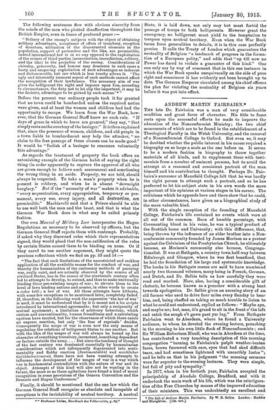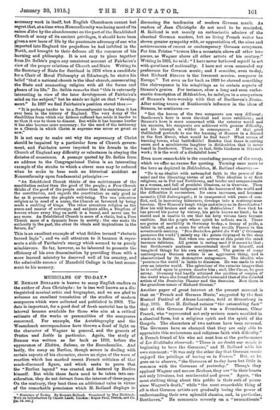ANDREW MARTIN FAIRBAIRN, THE late Dr. Fairbairn was a man
of very considerable erudition and great force of character. His title to fame rests upon the successful efforts he made to improve the education of the Nonconformist Ministry; the two chief monuments of which are to be found in the establishment of a Theological Faculty in the Welsh University, and the removal of a Nonconformist College to Oxford. But even so, it may be doubted whether the public interest in his career required a biography on so large a scale as the one before us. It seems to be a modern fashion in biography to throw together materials of all kinds, and to supplement these with testi- monials from a number of eminent persons, but to avoid the attempt at a reasoned and consistent portrait of the man himself and his contribution to thought. Perhaps Dr. Fair- bairn's successor at Mansfield College felt that he was hardly the right person to attempt such a portrait, and no he has preferred to let his subject state in his own words the more important of his opinions at various stages in his career. The criticisms which be appends here and there show that he could, in other circumstances, have given us a biographical study of the more valuable kind.
With the single exception of the founding of Mansfield College, Fairbairres life contained no events which were at all out of the common. Born of humble parentage, with Covenanting blood in his veins, he was a typical product of the Scottish home and University; with this difference, that, being thrown by the influence of an elder brother into a Non- conformist community founded by James Morison as a protest against the Calvinism of the Presbyterian Church, he ultimately became, as Morison's community also became, Congrega- tionalist. It was at Bathgate, a country town half-way between Edinburgh and Glasgow, where he was first beneficed, that he laid the foundation of his large and systematic knowledge. The books in his Bathgate manse are said to have numbered nearly two thousand volumes, many being in French, German, and Dutch, and Dr. Selbie tells us how carefully they were read and marked. Here, also, having a considerable gift of rhetoric, he became known as a preacher with a strong bent towards apologetics. Dr. Selbie gives an amusing story of an old farmer who used to drive four miles every Sunday to hear him, and, being chaffed on taking so much trouble to listen to what he could not understand, replied as follows "Maybe aye, and maybe no; but, man, it's grand to sit in the front o' the laft and catch the sough o't gown past yer lug." From Bathgate Fairbairn went to Aberdeen, where he found a University audience, to whom he devoted the evening lecture, preaching in the morning to his own little flock of Nonconformists ; and Sir William Robertson Nicoll, who was in Aberdeen at the time, has contributed a very touching description of this morning congregation "turning to Fairbairn's pulpit weather-beaten faces, brows furrowed with care, eyes that had shed difficult tears, and had sometimes lightened with unearthly lustre "; and he tells us that in his judgment "the morning sermons were far superior to the evening lectures. They were simple, but full of pity and Sympathy."
In 1877, when in his fortieth year, Fairbairn accepted the principalship of Airedale College, Bradford, and with it undertook the main work of his life, which was the reinvigora- tion of the Free Churches by means of the improved education of their ministers. This was undoubtedly an excellent and
• The Life of Andrew Martin Pairbairn. By W. B. Selbie. London: Hodder and Stoughton. [14sr. net.) necessary work in itself, but English Churchmen cannot but regret that, at a time when Nonconformity was losing most of its raison d'etre by the abandonment on the part of the Established Church of many of its ancient privileges, it should have been givens new lease of life by the passionate advocacy of one who imported into England the prejudices he had imbibed in the North, and brought to their defence all the resources of his learning and philosophy. It is not easy to piece together from Dr. Selbie's pages any consistent account of Fairbairn's view of the proper relations of Church and State. Writing to the Secretary of State for Scotland in 1876 when a candidate for a ()hair of Moral Philosophy at Edinburgh. he states his belief "that a national church is the ideal church, consecrating the State and connecting religion with all the forms and phases of its life." Dr. Selbie remarks that " this is extremely interesting in view of the later development of Fairbairn's mind on the subject" but he sheds no light on that "develop- ment." In 1897 we find Fairbairn's position stated thus It is perhaps harder to be a Nonconformist to-day than it has ever been in the history of England. The very decay of the disabilities from which our fathers suffered has made it harder to as than it was to them to dissent. But while it has become harder it has also become more necessary: for the need of the testimony to a Church in which Christ is supreme was never so great as now.'
It is not easy to make out why the supremacy of Christ should, be impaired by a particular form of Church govern- ment, and Fairbairn never imputed to his friends in the Church of England any difficulty or reluctance in obeying the dictates of conscience. A. passage quoted by Dr. Selbie from an address to the Congregational Union is an interesting example of the straits to which a clever man may be reduced when he seeks to base such an historical accident as Nonconformity upon fundamental principles :---
e An Established Church thinks of the maintenance of the constitution rather than the good of the people ; a Free Church thinks of the good of the people rather than the maintenance of the constitution, and regards the constitution as only good so far as it promotes the people's well-being. The ono conceives religion as in need of a nurse, the Church as favoured by being made a suckling of kings. The other conceives religion as the stereo and master of sovereign and subjects alike, a kingdom of heaven where every king on earth is a vassal, and never can ho any more. An Established Church is more of a static, but a Free Church more of a dynamic force in society: the one seeks its authority in the past, the other its ideals and inspirations in the future, ke.'“
This is an excellent example of what Belden termed " rhetoric turned logic"; and we call attention to it because it repre- sents a side of Fairbairn's energy which seemed to us purely mischievous. So far, however, as he laboured to promote the efficiency of his own denomination by providing them with a more learned ministry he deserved well of his country, and the admirable success of Mansfield College is the best monu- ment to his memory.



















































 Previous page
Previous page